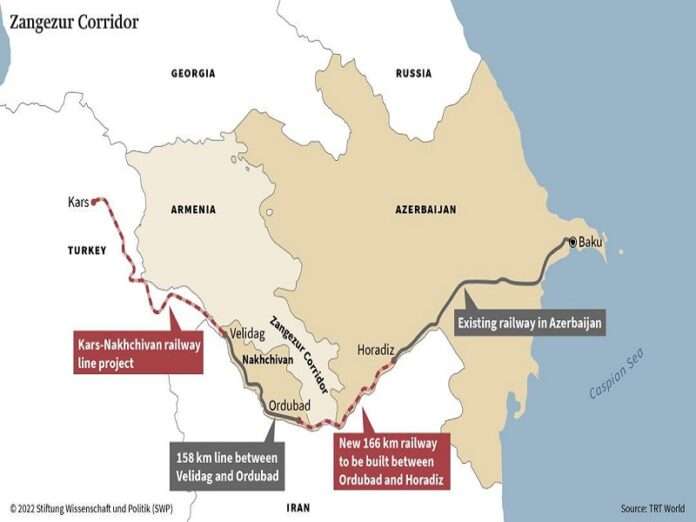The Iranian Supreme Leader tweeted last week that “The Islamic Republic of Iran believes the #Zangezur corridor is to the detriment of Armenia, and we reaffirm our steadfast position on this matter.” This followed his meeting with Armenian Prime Minister Pashinyan on Tuesday, who was in Tehran to attend President Pezeshkian’s inauguration, as well as recent reports that those two countries secretly signed a $500 million arms deal earlier this year for drones and air defenses.
From the looks of it, Iran appears to be arming Armenia (despite both side’s denials) on the pretext that Azerbaijan poses a threat to its territorial integrity, which is allegedly due to its demands that Yerevan implement the Zangezur Corridor. About that, this concept has been deliberately misportrayed by adversarial forces in the way that was just described, but the reality is that its essence was enshrined in the last clause of the Moscow-mediated November 2020 ceasefire between Armenia and Azerbaijan:
“All economic and transport links in the region shall be unblocked. The Republic of Armenia shall guarantee the safety of transport communication between the western regions of the Republic of Azerbaijan and the Nakhichevan Autonomous Republic with a view to organize the unimpeded movement of citizens, vehicles and cargo in both directions. Control over transport communication shall be exercised by the Border Guard Service bodies of the FSS of Russia.”
Iran knows this, but it’s purposely playing dumb because it stands to gain more by doing so. To explain, publicly condemning the Zangezur Corridor on the falsely implied pretext that it’s a threat to Armenia’s territorial integrity serves to encourage Yerevan to remain obstinate. This in turn creates a fertile market right next door to which Iranian arms can be exported and justifies the Islamic Republic facilitating the related export of Indian ones as well in a joint attempt to assist Armenia’s clumsy balancing act.
So long as Armenia officially remains within the CSTO and thus under Russia’s defense umbrella despite having suspended its membership in that group, then it’s unlikely that Azerbaijan would resort to force in order to get its neighbor to comply with the last clause of November 2020’s ceasefire. Accordingly, Azerbaijan might then become reliant on Iran’s parallel corridor to Nakhichevan and Turkiye, which was agreed to in October and analyzed here alongside other associated developments at the time.
To sum it up, Iran’s continued opposition to the Zangezur Corridor is self-serving and justified on false pretexts, but such a policy is the Islamic Republic’s sovereign right to promulgate. Its national interests are advanced by turning Armenia into a news arms market and raising the odds that Azerbaijan will conduct its envisaged cross-Armenian trade via the parallel corridor running through northern Iran. Azerbaijan obviously disapproves of Iran’s policy, but not enough to cut off relations with it.







